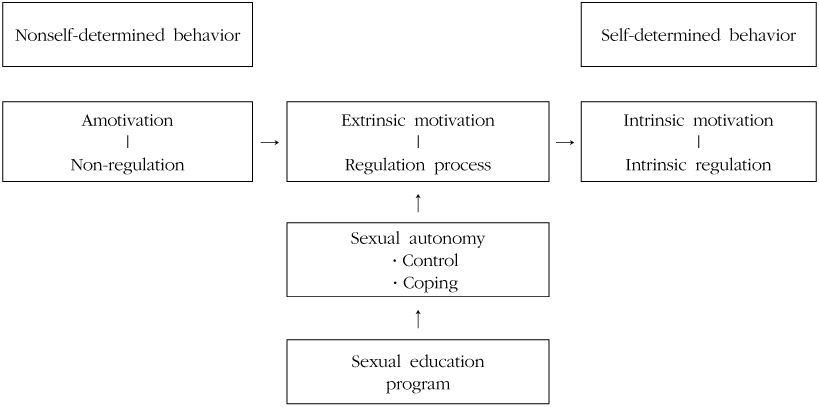Korean J Women Health Nurs.
2012 Jun;18(2):108-116. 10.4069/kjwhn.2012.18.2.108.
Effect of Sexual Education Program on Female College Student's Sexual Knowledge and Sexual Autonomy
- Affiliations
-
- 1College of Nursing, Sungshin Women's University, Seoul, Korea. nmchun@sungshin.ac.kr
- KMID: 2308250
- DOI: http://doi.org/10.4069/kjwhn.2012.18.2.108
Abstract
- PURPOSE
The purpose of this study was to evaluate the effect of the sexual education program on female college students' sexual knowledge and sexual autonomy.
METHODS
The integrative 5-week (15 hour) sexual education program reflecting control and coping aspects of sexual autonomy was developed based on self-determination theory. 59 female students were assigned to the experimental (n=29) and the control group (n=30). Students completed the sexual knowledge and the sexual autonomy questionnaires at prior to the program, right after and 10 weeks after the completion of the program. Independent t-test were used to test the effectiveness of the program.
RESULTS
Significant group differences were found on sexual autonomy score right after and 10weeks after the completion of the program. No significant group differences were found on sexual knowledge at any time after the program completion.
CONCLUSION
The results indicate that the 5-week Sexual Education Program was effective in increasing female college students' sexual autonomy. Nursing professors majoring women's health nursing may contribute to improving college students' sexual autonomy by opening the sexual education program as a general elective curriculum. Strategies to improve sexual knowledge need to be considered for better effectiveness of the program.
Figure
Cited by 1 articles
-
The impact of reproductive health knowledge, reproductive health-promoting behavior, and sexual communication on intention to visit obstetrics and gynecology in unmarried women: a cross-sectional study
Da-In Kang, Euna Park
Womens Health Nurs. 2024;30(4):309-317. doi: 10.4069/whn.2024.12.04.
Reference
-
1. Barber BK, Schluterman JM. Connectedness in the lives of children and adolescents: A call for greater conceptual clarity. Journal of Adolescent Health. 2008. 43:209–216. http://dx.doi.org/10.1016/j.jadohealth.2008.01.012.
Article2. Center for Disease Control. Status of HIV/AIDS infection as of December, 2010. 2010. Retrieved April 12, 2012. from http://www.cdc.go.kr/kcdchome/jsp/diseasedic/dic/DISEDIC0001Detail.jsp?menuid=512050&contentid=7667&boardid=null&appid=kcdcdz01&pageNum=null&sub=null&tabinx=1&q_had01=A&q_had02=2012&idxType=0&idxNum=8.3. Chang SB. Development of sexual autonomy measurement for college students. Korean Journal of Women Health Nursing. 2002. 8:106–115.
Article4. Choi MS, Ha NS. A study on knowledge, attitude, and experience in sex and sexual autonomy of college students. Korean Journal of Women Health Nursing. 2004. 10:318–330.
Article5. Han YR. The effects of AIDS education on baccalaureate nursing students. Journal of Korean Academy of Nursing. 2001. 31:467–476.6. Hur MH, Ahn HY, Kwak EA, Kim KM, Park JY, Lee JIR. A study on sexual behavior, and correlation between knowledge of contraception and attitude of contraception among university students. Journal of Korean Academy of Nursing. 2007. 37:267–275.
Article7. Jeon GS, Lee HY, Rhee SJ. Sexual knowledge, attitude and behaviors of Korea college students and effect of sexual education on sexual knowledge and attitudes. Journal of Korean Society for Health Education and Promotion. 2004. 21:45–68.8. Lee IS, Jeon MY, Kim YH, Jung MS. Knowledge in sex and need of sex education among community college students. Journal of Korean Academy of Community Health Nursing. 2000. 14:382–395.9. Liverpool J, McGhee M, Lollis C, Beckford M, Levine D. Knowledge, attitudes, and behavior of homeless African-American adolescents: Implications for HIV/AIDS prevention. Journal of the National Medical Association. 2002. 94:257–263.10. Ministry of Gender Equality and Family. Status of unmarried mother and needs assessment. 2005. Retrieved April 12, 2012. from http://www.mogef.go.kr/korea/view/policy/policy02_05a.jsp?func=view&idx=4192.11. Ministry of Gender Equality and Family. Revision of women's development act (11th). 2008. Retrieved February 2, 2012. from http://www.mogef.go.kr/korea/view/policy/policy03_02e.jsp?func=view&idx=3706.12. Ministry of Health and Welfare. National survey on trends of induced abortion. 2011. Retrieved April, 2012. from http://www.mohw.go.kr/front/jb/.13. Ott MA, Millstein SG, Ofner S, Halpern-Felsher BL. Greater expectations: Adolescents' positive motivations for sex. Perspectives on Sexual and Reproductive Health. 2006. 38:84–89.
Article14. Parkes A, Henderson M, Wight D, Nixon C. Is parenting associated with teenagers' early sexual risk-taking, autonomy and relationship with sexual partners? Perspectives on Sexual and Reproductive Health. 2011. 43:30–40. http://dx.doi.org/10.1363/4303011.
Article15. Ryan RM, Deci EL. Self-determination theory and the facilitation of intrinsic motivation, social development, and well-being. American Psychologist. 2000. 55:68–78. http://dx.doi.org/10.1037/0003-066X.55.1.68.
Article16. Shin YH, Chun YK, Cho SM, Cho YR. The effect of sex education program on knowledge related to sexually transmitted diseases and sexual autonomy among university students. Journal of Korean Academy of Nursing. 2005. 35:1304–1313.17. Soenens B, Vansteenkiste M, Lens W, Luyckx K, Goossens L, Beyers W, et al. Conceptualizing parental autonomy support: Adolescent perceptions of promotion of independence versus promotion of volitional functioning. Developmental Psychology. 2007. 43:633–646. http://dx.doi.org/10.1037/0012-1649.43.3.633.
Article18. Whang IM. A study of Korean students' sexual knowledge, self-regulation, attitude, and their perception of unwed pregnancy. 2009. Daejeon: Eulji University;Unpublished master's thesis.19. Wight D, Parkes A, Strange V, Allen E, Bonell C, Henderson M. The quality of young people's heterosexual relationships: A longitudinal analysis of characteristics shaping subjective experience. Perspectives on Sexual and Reproductive Health. 2008. 40:226–237. http://dx.doi.org/10.1363/4022608.
Article20. World Health Organization. Sexual health. 2010. Retrieved October 25, 2010. from http://www.who.int/topics/sexual_health/en/.21. Zimmer-Gembeck MJ, Helfand M. Ten years of longitudinal research on U.S. adolescent sexual behavior: Developmental correlates of sexual intercourse, and the importance of age, gender and ethnic background. Developmental Review. 2008. 28:153–224. http://dx.doi.org/10.1016/j.dr.2007.06.001.
Article
- Full Text Links
- Actions
-
Cited
- CITED
-
- Close
- Share
- Similar articles
-
- A Study on Knowledge, Attitude, and Experience in Sex and Sexual Autonomy of College Students
- The Effects of a Sexual Violence Counselor Program on Knowledge toward Sexual Violence, Sexual Autonomy and Rape Myths
- Change of the Sexual Knowledge and Sexual Attitude of the Primary School Children through Sexual Education Program
- The Effects of a Sex Education Program on Knowledge Related to Sexually Transmitted Diseases and Sexual Autonomy among University Students
- Effect of the Sexual Knowledge and Sexual Attitude of the Middle School Women Students through Sexual Education Program



